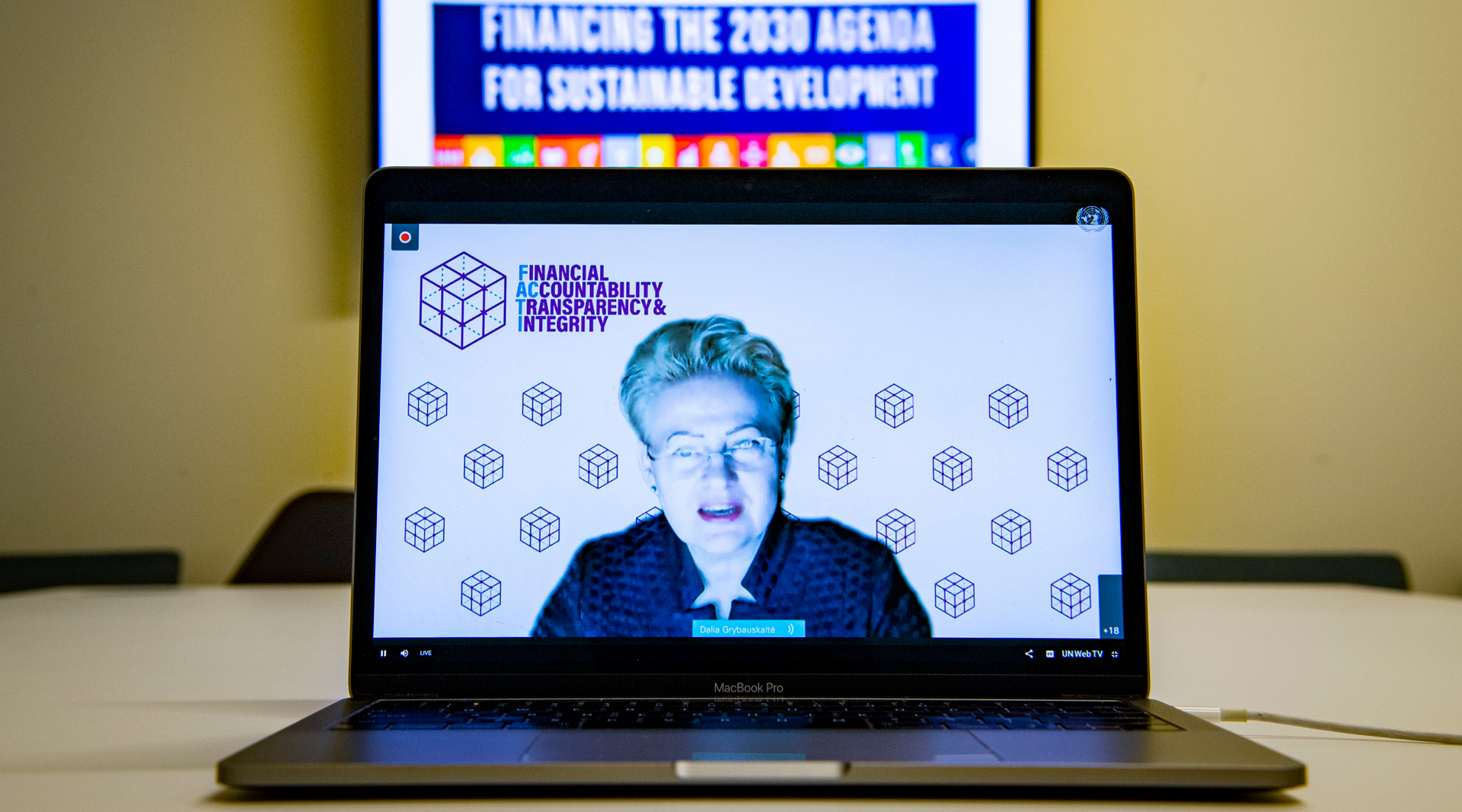FINCEN FILES
6 money laundering reforms that experts say need to happen right now
Failures exposed by the FinCEN Files investigation require urgent intervention, regulators, experts and politicians say.

The biggest banks in the world are moving vast amounts of money for drug cartels, corrupt regimes, arms traffickers and other international criminals after having pledged repeatedly to do more to staunch the flow of dirty money.
The system-wide failures exposed by the FinCEN Files, a 16-month investigation by more than 400 journalists, have led to calls for reform from prominent politicians and government bodies. The reporting even prompted the Financial Crimes Enforcement Network, the U.S. agency known as FinCEN tasked with overseeing bank compliance with money laundering laws, to ask for ideas about how to “enhance the effectiveness” of its operations.
So what’s to be done? A more robust enforcement system is within reach, say finance, legal and offshore experts interviewed by the International Consortium of Investigative Journalists. Here’s where to begin.
End ‘too big to jail’ for U.S. banks and bankers
The deferred prosecution agreement, or DPA, has become the go-to tool in the U.S. government’s efforts to force banks to crack down on criminal payments moving through their accounts. A financial institution in the cross-hairs of law enforcement agrees to something like probation: criminal charges are tabled, and in return, the bank pays a fine and agrees to reforms overseen by a monitor.
But critics say overuse and underenforcement of the DPA has let banks off the hook for egregious violations of money-laundering statutes with few long-term consequences. “They’ve become in effect the cost of doing business rather than a real punishment,” Jed Rakoff, a senior federal judge in Manhattan, told ICIJ.
Over the last decade at least 18 financial institutions signed DPAs for anti-money laundering or sanctions violations, an analysis by BuzzFeed News found. Four were fined a second time for violating the law — twice, the U.S. government responded to the repeat offense by simply renewing the same agreement that failed the first time.
ICIJ’s examination found that four global banks — JPMorgan Chase, HSBC, Standard Chartered Bank and Bank of New York Mellon — kept profiting from powerful and dangerous players after paying fines as part of DPAs.
How to convince financial institutions to take money laundering more seriously? Go after culpable leaders, Rakoff said. “To my mind the single greatest objection is that the ultimately responsible executives never get prosecuted at all,” he said. “I was a criminal defense lawyer for 15 years doing mostly white collar defense and the only thing that ever scared my client was prison, and boy that scared them.”
Tighten suspicious transaction reporting requirements
Suspicious activity reports that banks are required to file with regulators often lack crucial information, including the most basic facts regarding who is actually behind suspect multi-million-dollar money flows. This reflects crippling ignorance on the part of compliance officers, who told ICIJ they cannot properly do their jobs without this information — and it also hobbles law enforcement and bank regulators who use these SARs to inform their own investigations.
Compliance staffers’ questions to colleagues in private banking and other client-facing divisions “are often ignored, not answered to satisfaction, not answered in a timely manner,” Ross Delston, a Washington-based attorney who specializes in anti-money laundering systems, said. “Compliance officers experience a great deal of frustration when it comes to requests for information within their own organization.”
Delston says that a full solution will likely require massive regulatory changes. The most effective fix: force banks to keep customer information in a centralized database that compliance staff could access automatically, ending the troubled request-for-information process. In other words, bankers would no longer be the gatekeepers to information about customers they profit from.
Empower bank compliance officers
Bank staff tasked with monitoring transactions and raising red flags when necessary are the front line in the global fight against money laundering. But compliance officers told ICIJ that they often felt powerless to compel their own institutions to close accounts that appeared to be connected to criminal activity. Former HSBC compliance officer Alexis Grullon said that the suspicious activity reports he spent his days completing did little to stop concerning activity.
“Why are we filing SARs?” Grullon recalls wondering. “The account is still open. Nothing is actually being done.”
Stories like this are not new to Rick McDonell, the executive director of the Association of Certified Anti-Money Laundering Specialists (ACAMS). McDonell says that banks must give compliance officers a meaningful voice within their institutions. Specifically, he said, there should be clear, unobstructed pathways for compliance officials to elevate concerns over financial crime to officials within the bank with the power to close accounts or take other action.
McDonell said that while many banks have made strides to better empower their compliance people, others have not. Government regulators must use their supervisory power to examine obstacles that keep bank compliance officers’ concerns from being acted upon, he said. “On a global scale, there is still a long way to go in terms of effective supervision and effective compliance,” McDonell said.
End tax haven U.S.A.
U.S. jurisdictions such as Delaware, Wyoming and South Dakota can be even easier to abuse than the Caribbean tax havens of popular imagination. Some states don’t require any information on a company’s owner or manager to open a new business — less paperwork than what is often needed to obtain a library card.
Experts and regulators responded to the FinCEN Files investigation with calls to end the easy creation of “anonymous” companies – entities whose owners are not publicly recorded or shared with federal authorities – as a first step. “Anonymous shell companies … make it practically impossible to determine the identity of the perpetrators,” said Linda A. Lacewell, superintendent of the New York State Department of Financial Services, in an op-ed responding to the FinCEN Files investigation and its exposés of criminal activity.
Bills to require U.S. companies to disclose their owner or owners to FinCEN are before both chambers of Congress and have the support of President Donald Trump’s administration. The Senate bill would boost penalties for repeat offenders and require certain companies to disclose their true owners, including those with at least a 25% stake or who own a controlling interest. It would not create a public registry of owners, as some advocates and experts had hoped.
“The FinCEN Files series revealed longstanding problems [involving] willful violators of our nation’s laws,” said Ohio Sen. Sherrod Brown, the Democratic co-sponsor of the bill, in an interview with ICIJ. “We’re hopeful this new bill, that once it comes into law — and I think it will — it will be a lot harder for them to violate these laws and that they’ll pay a price when they do.”
Close the United Kingdom’s giant secrecy loophole
The U.K. is a money laundering hotbed. According to one estimate, more than 90 billion in dirty money is laundered each year through the City of London. A central problem has been the rise and misuse of anonymous companies known as LLPs and LPs incorporated through Companies House, the U.K.’s registrar of businesses, by people with ties to corruption, crime and even terrorism.
In 2016, the government moved to require most British companies to disclose individuals with more than 25% control. While the rules apply to all LLPs and to some LPs, the law contains no verification or enforcement mechanism, and many don’t provide ownership information.
An ICIJ analysis of LLP companies registered in England and Wales revealed an excess of $4.5 billion in funds, compared to the figures reported in a selection of LLP company accounts, filed with Companies House, casting doubts over the reliability and accuracy of their accounts data.
Days before the publication of the FinCEN Files, Companies House announced a litany of new reforms intended to clamp down on fraud and money laundering, including preventing company directors from being appointed until their identities are verified by Companies House.
Graham Barrow, an anti-money laundering expert, thinks that a few changes could radically alter the landscape of money laundering in the U.K. and stop the use of shell companies.
“First would be to introduce a requirement that at least one officer of any U.K. entity should be located here in the U.K. and accept accountability for the filings made by the company. Two would be to exclude from the register of Persons with Significant Control [i.e. the owners of the company] any entity that does not meet the current requirements.”
Europe has 27 different approaches to fighting financial crime. It’s time for the continent to work together.
The European Union’s 27 countries have primary responsibility for supervising and enforcing anti-money laundering laws. Persistent weaknesses led the European Commission to mandate stricter dirty money controls. Some countries, including Cyprus, Spain and the Netherlands, have been slow to introduce new rules, including overhauls that would make it easier to identify the owners of companies and trusts. Others, including Latvia and Malta, have long attracted criminals and billions of dollars in dirty money.
Responding to FinCEN Files, European politicians called for uniform regulations and for stronger supervision in the form of a new European agency or greater powers for the existing oversight body, the European Banking Authority.
“The existing Anti-Money Laundering (AML) system simply does not work,” said Eero Heinäluoma, a Finnish member of the European Parliament during a debate on the FinCEN Files. “It is a Swiss cheese, full of holes.”
Correction, Oct. 28: This story has been updated to remove Deutsche Bank from a list of global banks that have entered into deferred prosecution agreements with the U.S. government. Deutsche Bank has not entered into any DPAs, but has paid hundreds of millions of dollars in settlements to U.S. authorities for anti-money-laundering failures, including a $258 million civil settlement in 2015 over business dealings involving Iranian, Libyan, Syrian, Burmese and Sudanese financial institutions and other entities sanctioned by the U.S.



